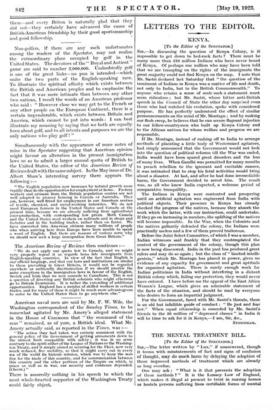LETTERS TO THE EDITOR.
KENYA.
[To the Editor of the SPECTATOR.] SIB,---In discussing the question of Kenya Colony, is it impossible to get down to bed-rock facts ? There must be many more than 310 million Indians who have never heard of Kenya. Of perhaps one million who may have been told that we are trampling on the rights of the immigrants the great majority could not find Kenya on the map. I note that Mr. Sastri declared last Saturday that " the question of the treatment of Indians in Kenya was a matter of life and death, not only to India, but to the British Commonwealth." To anyone who retains a sense of scale such a statement must seem ridiculous ; but Mr. Sastri, whose bitter anti-British speech in the Council of State the other day surprised even those who had watched his evolution, spoke with considered purpose. He has perfectly understood the effect of similar pronouncements on the mind of Mr. Montagu ; and by making our flesh creep, he believes that he can secure flagrant injustice to our fellow-countrymen who built up Kenya Colony and to the African natives for whose welfare and progress we are responsible.
If Mr. Montagu, instead of rushing off to India to arrange
methods of placating a little body of Westernized agitators, had simply announced that the Government would not look into the question of political reforms till the War was ended, India would have been spared great disorders and the loss of many lives. When Gandhi was permitted for many months to preach rebellion to the ignorant and excitable masses, it was intimated that to stop his fatal activities would bring about a disaster. At last, and after he had done irremediable harm, the Government decided to arrest him. The result was, as all who knew India expected, a welcome period of comparative tranquillity.
The Indians in Kenya were contented and prospering
until an artificial agitation was engineered from India with political objects. Their presence in Kenya has already checked the progress of the natives, because they absorb the work which the latter, with our instruction, could undertake. If they go on increasing in numbers, the uplifting of the natives will become impossible. In the War, when the Colonists and the natives gallantly defended the colony, the Indians were practically useless and a few of them proved traitorous.
Before the Joint Select Committee, of which I was a member,
Indian witnesses said frankly that they contemplated the control of the government of the colony, though this plan is now being disavowed. India in the past has produced great rulers and may do so again ; but the class of " limited intelli- gentsia," which Mr. Montagu has placed in power, gives no evidence of any capacity for government and great aptitude for organized agitation. There is surely enough work for Indian politicians in India without interfering in a distant British colony which, failing our protection, they would never have entered. I have before me the appeal of the East Africa Women's League, which gives an admirable statement of the facts of the situation, and should be read by everyone who desires to form an impartial judgment.
For the Government, faced with Mr. Sastri's threats, there is an old but infallible guide of conduct : " Be just and fear not." When equal citizenship is conceded by Mr. Sastri's friends to the 50 million of " depressed classes " in India it will be time to ask for it in Kenya.—I am, Sir, &c., SYDENHAM.










































 Previous page
Previous page